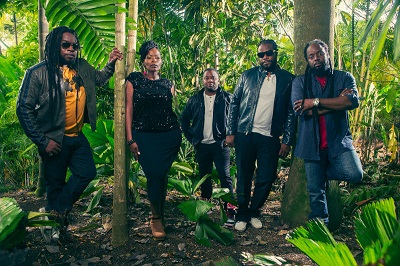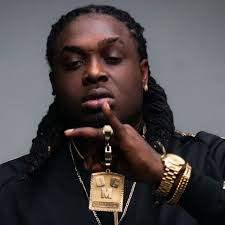Want to get your music out to over 40k radio and sound system dis? CLICK HERE
Stay up-to-date with all that's new at Dancehallreggaeworld, Click Here to subscribe for my updates and don't miss a thing!
Dancehall Reggae Group Morgan Heritage
Dancehall Reggae Group Morgan Heritage - The members of Morgan Heritage are Una Morgan on Keyboard and Vocals, Roy "Gramps" Morgan on Keyborad and Vocals, Peter Morgan - vocals, Nakhamyah "Lukes" Morgan - rhythm guitarist and Memo "Mr. Mojo" Morgan - percussion
 Dancehall Reggae Group Morgan Heritage
Dancehall Reggae Group Morgan HeritageIt was at a 1992 press conference held during Jamaica?s now defunct
Reggae Sunsplash (the forerunner to Reggae Sumfest, Jamaica's largest
reggae festival) singer Denroy Morgan introduced several of his 30
children to a contingent of international reporters. Most of the scribes
in attendance were familiar with Morgan as the reggae artist who had
topped the Billboard Hot 100 in 1982 with the R&B flavored hit I'll
Do Anything For You?.
Morgan spoke at length about his unwavering
commitment to Jah and his fruitful unions with three women that had
produced (at the time) 27 children. He reflected on moving his children
from their Brooklyn birthplace to Springfield, Massachusetts, so they
could pursue their education without the distractions of urban life.
As devout Rastafarians,
he noted, the family prayed together several times daily, observed
certain dietary restrictions and commuted to Brooklyn each weekend to
work on their musical craft.
Eight of Denroy's teenaged progeny
formed a band, Morgan Heritage, and their first performance in Jamaica
took place on the opening night of Sunsplash 1992. Their precocious
musicianship and assured stage presence generated such excitement, they
were invited to perform on Sunsplash's Saturday night finale, at the
conclusion of the set, Morgan Heritage were met by a representative of
MCA Records, who signed them, on the spot, to the label.
The
Morgan's MCA album "Miracle" was released in mid 1994; it took the band a
year to record and the record label even longer to figure out how to
market the group. "The kind of authentic reggae that we are known for,
they didn't want it, explained Morgan Heritage's lead vocalist Peetah
(Peter) Morgan. ?That album was their idea of what reggae was, pop
reggae." Displeased with MCA?s lack of support, the group elected not to
record a second album for the label.
After three decades in the United States, Denroy returned to Jamaica, settling in the parish of St. Thomas in 1995.
For
a period of approximately 18 months, the Morgan siblings divided their
time between recording at Jammy?s and Bobby Digital?s Kingston studios,
which resulted in two albums, Digital?s "Protect Us Jah" and Jammy's
"One Calling", released by VP Records in 1997 and 1998 respectively. The
group voiced their socially outspoken, spiritually empowering lyrics
over the producers, one-drop rhythm tracks which yielded a contemporary
roots reggae sound that was a much welcomed departure from their slick
pop offerings on "Miracle".
The finely honed modern roots
identity that has made Morgan Heritage one of reggae's most enduringly
successful acts is showcased throughout "The Journey Thus Far", a CD/DVD
compilation of the group?s finest recordings to date, plus two
previously unreleased tracks.
The CD commences with the title track from "Protect Us Jah" a simple yet
heartfelt prayer for spiritual strength sung over Bobby Digital?s
brilliant reworking of the ?Heathen? rhythm, i.e., the instrumentation
from the Bob Marley song by that name. From the same album, "Let's Make
Up" demonstrates the group?s flair for love songs and features Una?s
lead alongside her brother Gramps.
"Liberation" is the name of
the song and rhythm track taken from Morgan Heritage Family and Friends
Volume One, released in 1998 on the family's HMG label. Produced by the
group alongside their father Denroy, several artists voiced on the
rhythm including Capleton and Jah Cure but none was more significant than the Morgan's tune, a stirring tribute to the durability of conscious reggae music.
Heritage
again reached out to Bobby Digital for his production acumen on their
international breakthrough release "Don't Haffi Dread", released by VP
in 1999. "Don't Haffi Dread" continued along the same pioneering path as
"Liberation" and it was the first Morgan Heritage album to be recorded
with them playing their instruments live in the studio, a remarkable
achievement, Peetah explains, because "it was done at a time when we
were told live recording will never come back to Jamaica".
"Bobby
Digital has worked with everyone in the reggae business and he wanted
to do something different and he had never worked recording a group
live, Peetah continued, and from that point on, every record we did with
him was recorded live; that was a great accomplishment for a young
group. The title song from "Don't Haffi Dread" remains one of the most
requested in the group?s hit filled repertoire with its easily
sung, catchy refrain "you don?t haffi dread to be Rasta" (that is,
you don't have to wear dreadlocks to observe the tenants of the
Rastafarian faith).
"It's not everyone with dreads who embraces
the faith of Rastafari and its not every Rastaman that have dreadlocks,
Peetah explained. "It was the first time any one said something like
that on record, at the same time being Rastafarian. It caused a lot of
controversy and got us a lot of attention even in places we had never
performed."
Even the mainstream media took notice of the
Morgan's who, along with their father, were featured in a special
Fathers Day segment on the CBS network's longstanding Sunday Morning
news program. From the same album is the jaunty "Reggae Bring Back
Love", something the group does in each of their performances, and "New
Time, New Sign", another inspiring testament to their Rastafarian faith.
The
exquisite "Down By The River", taken from Heritage's fourth album "More
Teachings", released by VP in 2001, is an anthem of renewed spiritually
sung over producer Dean Fraser's flawless remake of the 1965 "What Kind
of World" rhythm, popularized in a hit by The Cables.
The Morgan?s returned to Bobby Digital, with whom they have created some
of their most outstanding tracks, for their 2003 VP Records release
"Three In One". The romantic ?She?s Still Loving Me? has an irresistible
country and western flavor that seamlessly dovetails with the band?s
roots reggae sensibilities while the contrast between Peetah's emotional
tenor and Gramp's soulful baritone make this one of the group's most
requested tunes.
"A Man is Still A Man" is characterized by
gentle harmonies, a rocking bass heavy rhythm and a timeless message
that is expressed with renewed vigor: "A man is still is still a man,
whether him rich or poor, black or white for sure, the only difference
is, if he?s good or evil".
Also from "Three In One" is the
group?s remix of their dance-reggae hit "Jump Around", a tribute to
reggae that evokes Bob Marley?s 1979 disco hit "Could you Be Loved" as
laminated with a 21st century punk edge.
"Before we joined the
Warped Tour, we were just a young upcoming reggae act but after eight
weeks of strictly punk rock throughout the summer touring with them we
realized that punk rock is pretty much on the same trend as reggae: it
is politically conscious, socially conscious, and it encourages people
to be who they are no matter what people think of you, notes Peetah. "We
were influenced by the energy and stage performance of punk rock and it
brought more edge to our sound. That is why we classify our music as
Rockaz music because it is reggae music that rocks."
Two of the
biggest reggae hits of 2004/2005 were produced on enormously popular
one-drop rhythms by Donovan "Don Corleon" Bennett and included on
Heritage?s 2005 VP Records release "Full Circle".
From the
group?s 10th Album "Mission in Progress" released by VP in 2008,
"Brooklyn and Jamaica" produced by Shane Brown, draws gritty parallels
between reggae's birthplace and the borough of kings, home to the
largest population of Jamaicans off of the island. "Ask me bout
Brooklyn, and how the ganja move in the streets and when you poor you
can't sleep. Don't ask me bout things that I don't know, ask me bout
reality and I will show."
"Nothing to Smile About" produced by
Kemar "DJ Flava" McGregor, presents a heart wrenching look at the
incongruity between the opulent resorts of tourist Jamaica versus the
impoverished conditions endured by the majority of its citizens,
underscored by Peetah's poignant delivery: "Look at that hungry child,
do you see anything fi smile bout" Look at the school weh deh youth dem
go fi get dem education, do you see anything fi smile bout" The sensual
"Love You Right" produced by Everton Hardware (better known as Singing
Melody) and Michael Steer demonstrates the group's romantic side, an
aspect of their identity much appreciated by their numerous female fans.
Throughout
their profound journey, Morgan Heritage has pioneered Jamaican music's
popularity in such far flung locales as the Seychelles Islands in the
Indian Ocean to the rural Northern U.S., where many residents had never
even heard the word reggae prior to their appearances there and they've
made roots reggae relevant to a generation of fans who weren't yet born
when Jamaican icons such as Bob Marley, Peter Tosh, and Dennis Brown were touring the world.
Return to Top dancehall and reggae groups page from here.
Return to Dancehall Reggae music from Reggae group Morgan Heritage
Return to Top Reggae Groups from Dancehall Reggae Group Morgan Heritage
Want to learn more about Reggae Music? check these pages below...
New! Talk to me
Was the information helpful? Something needs changing? I welcome your feedback here.
Great Articles You Might Have Missed
Please send us your Feedback, News, Photos, Press Releases, Music and/or Videos to our WhatsApp Number: 1-876-395-8008 or Email: necoflex@gmail.com
Not what you are looking for? Search the web for more Dancehall Reggae music information below...








New! Comments
Have your say about what you just read! Leave me a comment in the box below.